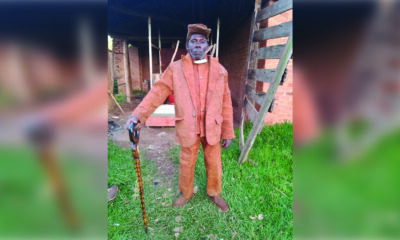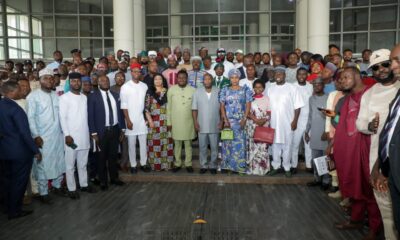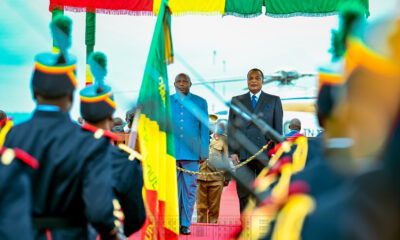ArgosData
Burundi’s Struggle Against Climate Change: NGOs Rally to Aid Vulnerable Communities

Burundi finds itself grappling with the harsh realities of climate change. Unpredictable and extreme weather patterns, including heavy rains, high winds, and prolonged dry spells, have taken a toll on the nation. The consequences are devastating: floods have swept through communities, destroying homes and livelihoods, while the constant threat of landslides looms large in the mountains.
In a nation already burdened with immense challenges, families in Burundi are now forced to work harder than ever to ensure the safety and well-being of their children. As climate shocks continue to disrupt harvests and displace communities, vulnerable children are at an increased risk of falling ill, experiencing violence, and facing abuse.
Multiple non-governmental organizations (NGOs) have stepped up to address the urgent needs of Burundi’s vulnerable communities in the face of climate-related disasters. These organizations work tirelessly to provide support, mitigate the effects of climate shocks, and build resilience within affected areas. Simultaneously, they strive to address other pressing issues, such as the COVID-19 pandemic and its socio-economic impacts on access to essential services.
Images captured by photographer Karel Prinsloo in March 2021 offer a stark glimpse into the ground realities of this ongoing crisis, shedding light on the complex nature of climate change in Burundi.
The displacement of families stands out as one of the distressing consequences of climate change. Over 114,000 people in Burundi have been uprooted from their homes due to climate-related disasters, a trend expected to continue. Such displacement exposes children to heightened risks of illness, violence, and abuse. In the farming community of Gatumba, for example, the Rusizi River and Lake Tanganyika overflowed their banks, resulting in floods that forced 25,000 people to flee. With water levels still rising, the process of recovery has proven to be arduous.
Children bear the brunt of natural disasters exacerbated by climate change. Extreme flooding and other calamities often disrupt educational opportunities, leading to a rise in school dropouts. Parents in Burundi, burdened by financial constraints, are unable to afford school fees, while others require their children to work to support their families. Additionally, the destruction of schools further hampers children’s access to education. The scarcity of food, coupled with poor sanitation and hygiene conditions, leaves children vulnerable to malnutrition and disease.
NGOs operating in Burundi have devised comprehensive action plans to address these urgent issues. Their focus is on treating children suffering from severe malnutrition, ensuring access to safe water, and enhancing health services to combat diseases such as COVID-19, Ebola, malaria, measles, and cholera. These organizations also collaborate with local partners to build resilient health and social systems.
The aftermath of heavy rains in the spring of 2020 serves as a stark reminder of the devastating impact of climate change in Gatumba. More than 10,000 homes were swept away, and the majority of schools in the district were severely damaged, leading to their closure. Large sections of the area still remain submerged, transforming once-productive fields into breeding grounds for waterborne diseases. Families like Jeannette’s, whose clay homes disintegrated during the flooding, now find themselves living in tarpaulin tents reinforced with scraps of tin. Stagnant and contaminated water surrounds their neighbourhood, creating a dangerous environment that sometimes attracts wildlife like hippos and crocodiles. Jeannette, a seamstress, works tirelessly to support her family under such challenging circumstances
Communities in Burundi live under constant threat in the wake of climate change. In December 2019, heavy rainfall coupled with deforestation triggered a series of landslides, devastating parts of northern Burundi. The village of Gisheke, for instance, lost over 350 homes, and 37 lives were claimed, with some bodies never recovered. Efforts to rebuild have been made, but the area remains highly vulnerable. Thomas Misego, a former village chief, expresses the persistent fear that grips the community whenever rain clouds gather.
Kibande Hill, situated approximately 120 miles (193.12 km) from Gisheke, exemplifies another climate-related crisis. Drought has plagued the region for three consecutive years, resulting in crop failures. Food deprivation has become a grim reality, with children often surviving on a single meal consisting of boiled cassava leaves. Janvière, a single mother seen holding her 9-month-old daughter Estella, faces immense challenges in managing her household amidst these circumstances. She currently resides in a shelter, working on someone else’s small plot of land for meagre wages, while her children stay at home alone. Tragically, their previous home was lost to storm damage shortly after Janvière sold the tin roof to buy food.
Burundi’s battle against climate change is ongoing and poses profound challenges. NGOs, working hand-in-hand with local communities, must continue to prioritize the urgent needs of vulnerable populations. It is crucial for international support to flow in to assist Burundi in building resilience and securing a better future for its children and families.













